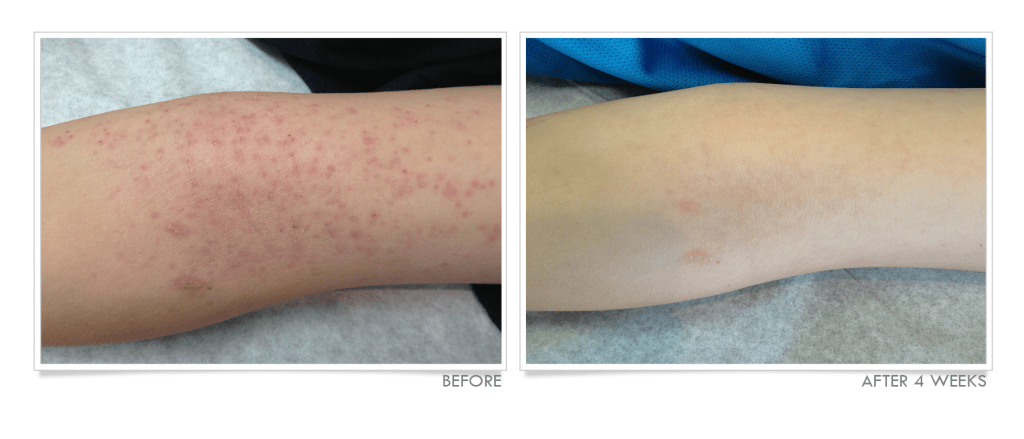As a continuation of National Skin Care Awareness Month, we are continuing our Four Part Series of Skin Care Myths We All Need to Know.
Myth #2: Topical steroids and antibiotics are the only way to treat eczema. False.
Many of my eczema patients come in after receiving multiple prescriptions for topical steroids and antibiotics for their eczema treatment. While topical steroids and antibiotics do produce short-term visible benefits for atopic eczema, they are not effective at repairing the skin barrier.
In my experience, the use of antibiotics is almost never an effective way to treat atopic dermatitis. We do know that people who have eczema are subject to colonization, and sometimes overt infection with Staph. aureus. Staph. aureus thrives in an environment that is more alkaline than the normal healthy skin barrier and therefore, if your skin barrier is not acidic enough, the Staph. aureus will move on in.
By acidifiying the skin barrier, I have learned that antibiotics are almost never necessary. In fact, I have only ever prescribed oral antibiotics to an eczema patient once in my career, and this was a boy who was very neglected and who was covered in scabs and infection all over his body.
For all other patients, even those who have overt growth of Staph., as most eczema patients do, I like to focus on pH optimization—a way of making the skin barrier unfriendly to Staph., so the Staph. is unable to thrive. I have researched many different acids and their respective benefits and drawbacks when coming in contact with the skin. I have found that vinegar and polyhydroxy acids are the best and safest (in my opinion) ways to acidify the skin barrier. I recommend the use of vinegar baths, a vinegar spray, or the use of a vinegar and polyhydroxy acid gel before you apply any moisturizers or steroids.
 I have my patients use the TrueLipids Ulitmate Eczema Kit after acidifying their skin. Apply as follows:
I have my patients use the TrueLipids Ulitmate Eczema Kit after acidifying their skin. Apply as follows:
- Appy TrueLipids Eczema Experts 1% Hydrocortisone Cream first, and then TrueLipids Relieve & Protect Ointment 2-4x per day until skin looks normal.
- Do this for approximately two weeks or less for mild and moderate cases of eczema.
- Once you skin looks and feels healthy and normal, then stop use of the Eczema Experts 1% Hydrocortisone Cream, and replace it with the TrueLipids TrueTherapy Ceramide+ Cream, followed by Relieve & Protect Ointment 2x per day for maintenance.
The following patient has severe atopic dermatitis and he reports that antibiotics actually make his eczema worse every time he takes them. We decided to do daily vinegar baths with steroids and TrueLipids. He is the best he has ever been in his adult life.
 You can do a vinegar bath by adding either white or apple cider vinegar to the bath:
You can do a vinegar bath by adding either white or apple cider vinegar to the bath:
- Add enough vinegar so the pH of the water is between 4.0 and 4.4–you will need to buy a pH meter to put in the water.
- Get in the tub and just soak.
- When you’re finished, do not rinse off the vinegar water; just blot yourself dry and then apply your emollients on top.
Now, for the topical steroid part of the myth.
Pretty much everyone uses steroids to control their eczema. Steroids have been shown to be effective at decreasing inflammation and the effects of inflammation in the skin barrier. But they have also been shown to break down the skin barrier at the same time, which leads to a serious case of catch twenty-two. By combining your steroids with a skin barrier optimizing emollient, you can address the inflammation and benefit the skin barrier at the same time.
Once the skin barrier is back to normal, it is important to stop the steroid and then to maintain the healthy skin barrier with skin barrier optimizing moisturizers. The skin barrier in atopic eczema has been shown to be deficient in certain lipids (fats) including cholesterol esters (not cholesterol), ceramides, and very long-chain fatty acids. In eczema, the skin barrier is also overly alkaline (not acidic enough), is infected (another result of being overly alkaline) and unable to produce some of the skin lipids (another result of being overly alkaline) and the skin barrier is susceptible to allergic reaction and irritation from certain chemicals. By using moisturizers that are designed to address all of these things at the same time, you may be able to maintain healthy, eczema-free skin for a long, long time.

